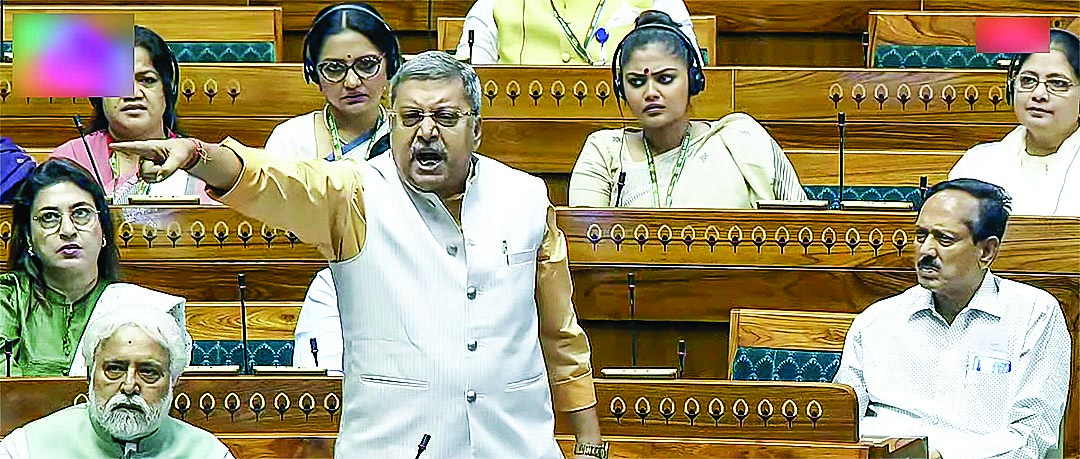It is clear that the target of the I.N.D.I. Alliance is not so much the BJP as it is PM Modi.
Given the manner in which proceedings in the just concluded session of Parliament took place, it is clear that what this columnist had (before the I.N.D.I. Alliance got formed) termed the Anyone but Modi (ABM) campaign had been working towards the BJP Lok Sabha tally in 2024 falling to 220 seats or less. Its objective was to ensure that they would thereby deny Prime Minister Narendra Modi a third term. Rahul Gandhi, the Prime Ministerial face of the I.N.D.I. Alliance, publicly spoke of the 220 Lok Sabha seats that in his view was all that the BJP would win in the 2024 polls. An immense effort went towards attaining this objective, including an effort that sought to characterise Prime Minister Narendra Modi in the most unflattering of hues. Across almost every district in the country, a campaign of personal attack was mounted against him. Given such a pan-Indian effort, it was small wonder that leaders of the I.N.D.I. Alliance used to claim before the polls every day that the overall ground situation had changed against another term as Prime Minister for the incumbent. It was more their own ground game that had changed, although admittedly a ground game that became more effective in denying Lok Sabha seats to the BJP, including in the party’s bastion of Uttar Pradesh.
The big gainer in the 2024 Lok Sabha polls is Akhilesh Yadav, gaining around six times more seats than he could in 2019. The largest I.N.D.I. Alliance partner, the Congress Party, could not even double in 2024 its 2019 tally of 52 seats. Only after an independent MP joined the Congress soon after the polls could its tally reach the three-figure mark. Worst of all for the ABM group, the BJP tally was more than the ABM target of 220 by 20 more seats. As a consequence, the Prime Minister secured a third term for himself, a feat earlier achieved only by the first Prime Minister of free India, Jawaharlal Nehru. The objective for which the I.N.D.I. Alliance was set up, apart from trying to get enough seats to form the Union Government itself, was to ensure that the Modi era ended with the close of Modi 2.0. Instead, the country has embarked on Modi 3.0.
Neerja Chowdury, a superb political journalist, revealed to a Hindi channel that after his 1989 poll defeat, Rajiv Gandhi had been advised three courses of action by his cousin Arun Nehru, should Rajiv secure a second term as PM in the 1991 polls. These were to build the Ram Mandir, repeal Article 370 and introduce a Uniform Civil Code. The electoral decline of Rajiv Gandhi began with the reversal through a new law of the Supreme Court judgement backing the rights after divorce of Shah Bano. His dilemma was that even liberal Muslim intellectuals close to Rajiv Gandhi had told him to ignore the view of Arif Mohammad Khan that Muslims overall, especially women, welcomed the Supreme Court judgement. They were wrong and Arif was right, as the Muslim community is as willing to embrace reform as any other community. Had Modi not been in office when Triple Talaq was abolished, an alternative government may have repeated the error made by Rajiv of believing that the thinking of a fringe represented the views of the Muslim community as a whole. The welcome given by Muslims to the repeal of Triple Talaq shows the overall welcome for such reforms.
The I.N.D.I. Alliance strategy was focused on specific caste and community groups, and the electoral message was so designed as to appeal to as many of them as was possible. An impression was created that the post of Prime Minister in an India Alliance government would go to Mallikarjun Kharge, a politician senior enough to make such a perception credible. After the 2019 polls, Congress fell short of the 10% Lok Sabha seat requirement for a Leader of the Opposition. Kharge was only treated as the notional LoP but was not actually as LoP in terms of constitutional position. Once the 10% threshold was crossed in 2024, it was Rahul Gandhi who took on the important Constitutional role of Leader of the Opposition. No other party in the I.N.D.I. Alliance had close to 10% of the seats in the way Congress had, so it was a given that the post of LoP would go to that party. Kharge was not given a chance to become the LoP in fact, rather than just in name when the chance came for that promotion. Rather, it was Rahul Gandhi who was chosen as the LoP by the Congress Party. As the perceived Prime Ministerial face during the 2024 polls, Kharge had fulfilled the role assigned to him, which was to win over as many votes as possible that were cast on the prospect of a Dalit leader first becoming the Prime Minister of India should the I.N.D.I. Alliance come to power.
It was clear from both the Lok Sabha campaign as well as the first session of the incoming Parliament that the target of the I.N.D.I. Alliance was not so much the BJP as it was Prime Minister Modi. Despite what was clearly an unprecedented effort since 2019 to prevent Modi 3.0, a third term for the PM could not be prevented. Making personal attacks on Narendra Modi ultimately boomeranged on the political parties making them, in both Gujarat and since 2014, in the rest of the country. That is a lesson from history that it would be well to remember.

